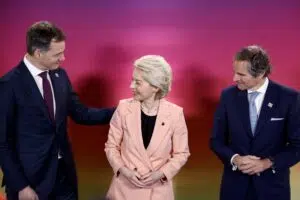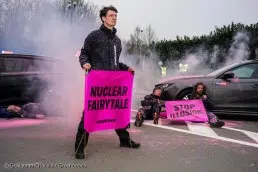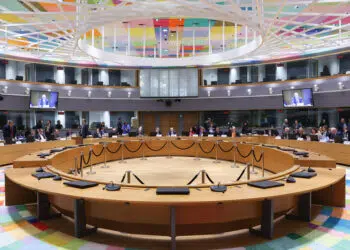Brussels – As EU leaders prepare for discussions at the European Council, Brussels hosted another event of particular importance for the future of the EU and beyond. Leaders of the most open-minded countries on the nuclear energy front gathered today (March 21) in the shadow of the Atomium–the monument built in 1958 for the International Exhibition in the Belgian capital–to sign a Declaration establishing common priorities and understandings for pushing this energy source for civilian purposes as part of the transition to a net-zero-emissions society.
“Our European Commission projections also show that renewable energy sources in majority, are complemented by nuclear energy, and will be the backbone of the EU power production by 2050,” the President of the European Commission, Ursula von der Leyen, said at the 2024 Nuclear Energy Summit co-chaired by the Belgian prime minister and rotating President of the EU Council Alexander De Croo and the Director General of the International Atomic Energy Agency (IAEA), Rafael Grossi. Words confirmed by the President of the European Council, Charles Michel, who also spoke at the beginning of the first high-level summit on the subject: “We must build a true Energy Union, nuclear power can play a role,” also thanks to technological innovation “such as that on small modular reactors, which can be game-changers for the future.” Speaking of small modular reactors, the number one Union executive recalled the “ongoing race” at the EU level among leading countries and companies on this “promising” technology. Looking forward to the strategic plan expected in 2025, von der Leyen dwelt on the fact that “innovation in nuclear technologies is a very dynamic space,” and now we need to “prove this technology and bring it to the market.”

Picking up on Grossi’s words – that “from an energy and security point of view, in the current context, nuclear energy can make an important contribution” – the EU Commission chief pointed out that “many countries are reconsidering the potential role nuclear power could play” in helping to achieve EU climate goals, despite the “slow but steady decline in market share” even in the Union (from one-third of power generation in the 1990s to 22 percent today). While “choices on the energy mix are up to member states,” it should be noted that “nuclear power is a resource that helps provide more independence, freedom, and influence,” Michel said: “It can help address the climate crisis and build our strategic autonomy.”
In the context of the urgency of the climate crisis, “countries need to consider their options carefully before they forego a readily available source of low-emission electricity,” von der Leyen said. “Extending the safe operation of today’s nuclear fleet is one of the cheapest ways to secure clean power at scale: It can help pave a cost-effective path to net zero.” It is why extending the lifetime of existing nuclear power plants should be considered, “provided their safe operation.” With a final warning to those who will focus on the atom to push the transition to net-zero emissions: “The future of nuclear depends on the industry’s ability to deliver on time and on budget,” particularly on building power plants without “significant additional costs and overruns,” von der Leyen concluded.

Credits. Greenpeace
Activists of Greenpeace France this morning delayed the arrival of several official delegations to the international nuclear energy summit. As the motorcades approached, non-violent activists threw pink powder, lit pink flares, and used bicycles and vehicles to block the main access routes to the summit at the Brussels Expo, the city’s main exhibition center. Several activists also climbed parts of the summit venue, displaying pink banners reading “NUCLEAR FAIRY TALE.” The protest aims to emphasize that nuclear power is a dangerous distraction from real climate solutions.
English version by the Translation Service of Withub






